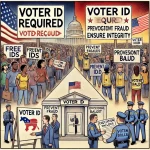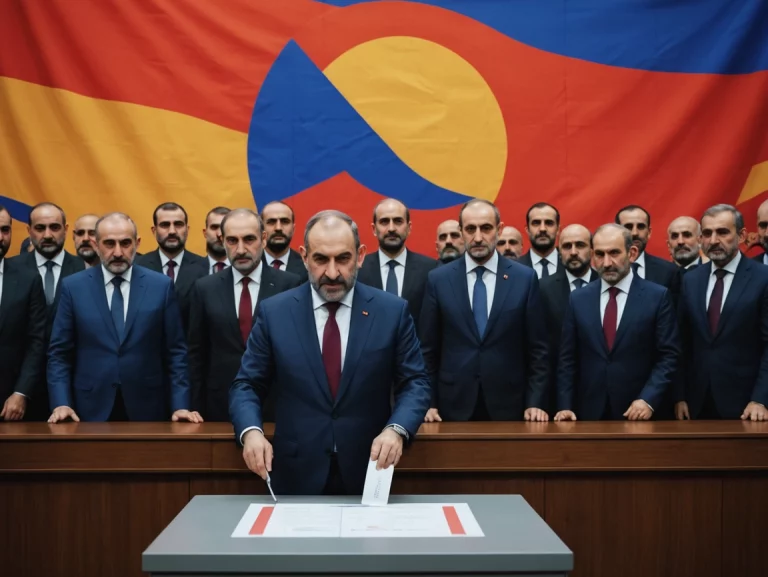The debate over voter ID laws in the United States is a complex and contentious issue, deeply intertwined with concerns about election integrity, voter suppression, and partisan advantage. Here’s an in-depth look at why some states are pushing for stricter voter ID requirements, the differences in these laws across various states, the partisan divide on the issue, and potential solutions.
Why Some States Want More Voter ID
Proponents of stricter voter ID laws, predominantly Republicans, argue that these measures are necessary to prevent voter fraud and ensure the integrity of elections. They claim that requiring identification at the polls helps to confirm that each vote is cast by a legitimate, eligible voter, thereby maintaining public confidence in the electoral process.
Differences Across States in Voter ID Requirements
Voter ID requirements vary significantly from state to state, with some requiring photo identification and others accepting non-photo IDs. The stringency of these requirements can be grouped into several categories:
1. Strict Photo ID: States like Georgia, Indiana, and Wisconsin require voters to present a government-issued photo ID at the polls. If voters do not have the required ID, they may cast a provisional ballot but must take additional steps for their vote to be counted.
2. Non-Strict Photo ID: States like Florida and Michigan also require photo ID but offer more lenient provisions for voters who do not have one at the polls, such as signing an affidavit or having their identity verified by election officials.
3. Non-Strict Non-Photo ID: States like Ohio and North Carolina accept a broader range of identification, including documents without a photo, such as utility bills or bank statements, to establish voter identity.
4. No ID Required: Some states, like New York and California, do not require voters to present ID at the polls but may have other mechanisms in place to verify voter eligibility.
Partisan Differences in Voter ID Laws
There is a clear partisan divide on the issue of voter ID laws, with significant differences between Republican and Democrat-dominated states.
Republican-Dominated States: These states are more likely to enact stricter voter ID laws. The Republican argument centers on the need to prevent voter fraud and ensure the sanctity of elections. They often point to isolated cases of fraud and the potential for abuse as justification for these measures. Republicans also believe that robust ID requirements increase public trust in the electoral process.
Democrat-Dominated States: Democratic states tend to oppose strict voter ID laws, arguing that they disproportionately affect minority, elderly, and low-income voters, who are less likely to possess the required forms of ID. Democrats contend that voter ID laws can act as a form of voter suppression, reducing turnout among demographics that traditionally support Democratic candidates. They emphasize that voter fraud is extremely rare and that the focus should be on making voting more accessible rather than imposing additional hurdles.
Motivations Behind the Push for Voter ID
Republican Motivations:
1. Preventing Fraud: Republicans argue that stricter voter ID laws prevent impersonation fraud, double voting, and voting by ineligible individuals.
2. Public Confidence: They believe that these measures enhance public confidence in the electoral system, ensuring that each vote is legitimate.
3. Electoral Advantage: There is also a strategic element, as voter ID laws can potentially reduce turnout among groups that tend to vote Democrat.
Democratic Opposition:
1. Voter Suppression: Democrats argue that voter ID laws disproportionately affect marginalized groups, creating barriers that can disenfranchise eligible voters.
2. Low Incidence of Fraud: They highlight studies showing that voter fraud is extremely rare and that existing measures are sufficient to address it.
3. Accessibility: Democrats advocate for making voting easier and more accessible to all eligible voters, ensuring that everyone has the opportunity to participate in the democratic process.
Is There a Fair Solution?
Finding a fair solution to the voter ID debate requires balancing concerns about election integrity with the need to ensure broad voter access. Potential solutions could include:
1. Broad Acceptance of IDs: Allowing a wide range of identification forms, including both photo and non-photo IDs, can help accommodate voters who may not have government-issued photo IDs.
2. Free and Accessible IDs: States could provide free photo IDs to any eligible voter who requests one, along with outreach programs to ensure that all voters are aware of how to obtain an ID.
3. Provisional Ballots: Ensuring that voters without ID can cast provisional ballots that are counted once their identity is confirmed can balance security with access.
4. Education and Assistance: Implementing voter education programs and offering assistance with the ID application process can help mitigate the impact of voter ID laws on marginalized communities.
5. Compromise Legislation: Bipartisan efforts to craft voter ID laws that address both fraud prevention and access concerns could help bridge the partisan divide. This might involve input from various stakeholders, including civil rights organizations and election officials, to design balanced policies.
Conclusion
The debate over voter ID laws in the United States reflects broader tensions between ensuring election integrity and preventing voter suppression. While Republicans emphasize the need for stricter ID requirements to prevent fraud, Democrats focus on the potential for such laws to disenfranchise vulnerable populations. A fair solution would need to address these concerns by ensuring that voter ID laws do not unfairly impact eligible voters while maintaining measures to uphold the integrity of the electoral process. Through compromise and innovation, it is possible to create a voting system that is both secure and accessible to all.



